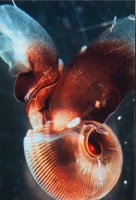Papua witness
I am en route to Raja Ampat in West Papua, which lies in the centre of the "coral triangle", and may harbour the greatest marine biodiversity on Earth. A focus for the expedition is the leatherback turtle population, which has probably co-existed with these reefs for many tens of millions of years.It seems a strange thing to be doing when the world is tearing itself apart. But if by writing about it I can help more people think a little more about part of the biodiversity we are losing then maybe it will be worthwhile.By way of background spiel, an article shortly to appear at Artists' Project Earth is attached as a comment to this post.
WHC -- round 1
It is reported that UNESCO's World Heritage Committee meeting yesterday in Lithuania rejected calls from campaigners to act urgently to protect the world's two longest barrier reefs and three mountain areas from the effects of climate change.
As this article explains, the World Heritage Convention, set up in 1972 to "preserve the world's natural and scenic areas", requires all countries to pass listed sites intact to future generations.
Conservationists argue that this will not happen unless urgent action is taken to cut emissions of greenhouse gas emissions. But government delegates from the US, Australia and Canada are reported to have to led a rejection of the call.
A rejection is surely not a surprise. What next? As noted in several places including here and here, it may still be early days in the battles concerning scientific, legal and public opinion.
Coral restoration
An article by Paul Marks in New Scientist describes what sounds like interesting work by Baruch Rinkevich and colleagues on coral gardening (Intensive care heals damaged reefs). But the article doesn't refer to other projects to cultivate coral world wide which have had varying degrees of success.
Acid trip
 Impacts of Ocean Acidification on Coral Reefs and Other Marine Calcifiers is published by NCAR today.It represents, say the editors, a "convergence on the major scientific issues that should be pursued in the next 5-10 years".In the draft of a forthcoming article for New Scientist, a leading researcher says "As a biologist [ocean acidification] is alarming. As a geologist, it's absolutely terrifying".
Impacts of Ocean Acidification on Coral Reefs and Other Marine Calcifiers is published by NCAR today.It represents, say the editors, a "convergence on the major scientific issues that should be pursued in the next 5-10 years".In the draft of a forthcoming article for New Scientist, a leading researcher says "As a biologist [ocean acidification] is alarming. As a geologist, it's absolutely terrifying".
